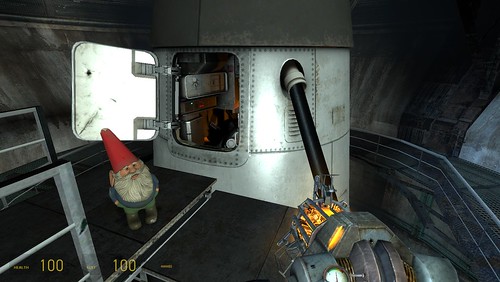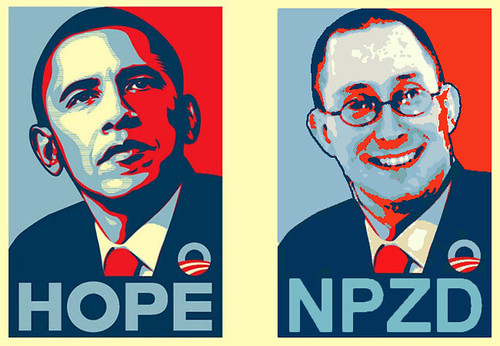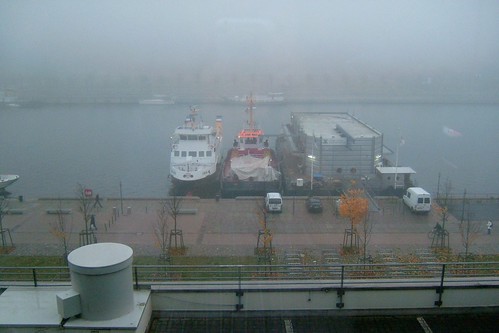We went to another of the
Christians in Science biannual seminars last night. This one was given by an OU historian of science called
Colin Russell, and was entitled "Science and Faith at War: Myths and Fables, Old and New". It focused on the so-called
conflict thesis of the relationship between science and religion.
Essentially the thesis is that, both historically and theoretically, these two cultural forces are irrevocably at war with one another. The thesis is pretty mainstream in the culture, but the contention of the speaker is that it is both founded on myths and has no theoretical basis. This latter view, of course, doesn't sit well with the likes of
Richard Dawkins or
A.C. Grayling, while the late
Stephen J. Gould proposed the concept of
non-overlapping magisteria (NOMA) to try to diffuse the purported conflict.
The speaker's main strategy was to cast doubt on the historical basis for the alleged conflict. This, actually, is quite successful, since ostensibly famous examples such as
Galileo and
Darwin (both discussed by the speaker) turn out not to be quite as straightforward as the conflict narrative has handled them. This isn't to say that there was no conflict in their lives with religion (there obviously was
some), but that building the case for the conflict thesis around them is misplaced.
That said, while the speaker was somewhat successful is dismissing aspects of the conflict thesis' case, he seemed (to me, anyway) to go far too far the other way, and blithely ignored or discounted the somewhat weaker evidence that the examples he dismissed still provided. Generally, there was something of a whiff of a
straw man about the presentation of the conflict thesis by the speaker. It was almost as if he was arguing against the great proponents of the thesis by (rightly) countering their overstated bluster with his own.
However, where the speaker really came unstuck was on the topic of present day
creationism. Possibly because he realises that it truly does represent a latter day conflict, he essentially dismissed it as some sort of fringe activity that wasn't representative of current religious thought. While he's right that many religious figures and organisations have disavowed it, it was a bit disingenuous of him to write it off just because he doesn't happen to believe it. He provided no grounds for an impartial observer to favour his view of religion over that of the literalist creationists. Instead he seemed to just imply that they're luddites who haven't yet come to understand his much deeper comprehension of the Christian faith.
Although I think that they're at best simply ignorant, I do think that the creationists have got something here. While they go to
absurd lengths of fantasy to justify a literal reading of Genesis, they recognise that once you start labelling a religious text as a mixture of metaphor and literal truth, you're on something of a slippery slope. That said, while I don't buy it (= understatement of the year), I think that it's perfectly possible that a metaphorical Genesis gave way to a literal Jesus. But given that almost all religions deal with events that can't now be objectively verified or which occurred before accurate or comprehensive records were maintained by historians, the factual basis for any of their wilder claims is never going to materialise (short of divine intervention, of course).
Anyway, after this, the speaker dissolved into a long series of platitudes and the sort of "neither metaphor or literal" gibberish that appears common in these lectures. The latter is like a red-rag to me - it might play well with the faithful masses, but it's (a) ineffective and confusing; (b) a deliberate misuse of language to muddy the intellectual waters (c.f. Garrett Hardin's "literate filter"); and (c) leaves me with the suspicion that an otherwise intelligent person realises that there's no empirical basis for their faith (surely the definition of faith?) but that they won't come out and say so. Basically crazy-talk.
In passing, regarding the speaker's presentation style, he was clearly born and educated not only long before the Powerpointocene Epoch, but actually prior to the Overheadozoic Era. It was a classic talking-only lecture. Which, unfortunately, didn't suit the speaker's memory. There were a couple of occasions where he seemed to lose the thread of his argument, despite the fact that this was an overview talk rather than something very specialised or detailed. This wasn't important to me, since I know a bit about what he was talking about, but must have been a bit confusing for people less familiar with the ideas.
Anyway, all that said, while I profoundly disagreed with the thrust of what he said (though I completely accept the overstatement of the conflict thesis), he was certainly one of the more honourable of the speakers that Christians in Science have attracted. No
McGrath-style duplicity and lawyering here.
P.S. I forgot to add above (probably because it's just so ridiculous if taken at face value) that the speaker identified Jesus' resurrection as the most historically verified event ever. Or something like that. It's possible that he meant only the subcategory of "events that happened to Jesus", rather than "events that have occurred in the world at some point". But he wasn't exactly clear on this point.
I think this was the moment, and it's affected all of the speakers in this series of lectures, when he "jumped the shark" and used the authority that he'd built up during the lecture to dress up his personal faith in Christianity as if it were a hard, undeniable fact. Even though all of the speakers have had some connection to science, at some point in the evening they make a
non-sequitur where suddenly the mythology underlying their particular beliefs suddenly becomes empirical truth.
This is the kind of thing that should cause
cognitive dissonance, but all of the speakers have been able to "hold it together". Speaking as a heathen, I read this "leap" as a declaration of their faith, although all of them have presented it in quite different terms. It's almost as if, as scientists, they
know that they can't join-the-dots from base reality to their particular beliefs, and that they
know that this is a major stumbling block. If they can't make the connection, how do they know that their beliefs are the correct ones? So, to get around this, they baldly state that (their particular flavour of) Christianity is plainly and unimpeachably a fact of the universe. No supporting evidence; no suggestion that this is an article of faith; just a straight "I'm a scientist, so this must be true" statement. If you say it often enough to yourself maybe it even becomes true and no longer requires a leap?
 The novel is constructed as a series of seven letters written nightly by the protagonist, Balram Halwai, to Wen Jiabao, the Premier of the People's Republic of China, soon to visit India. The letters present Balram's rise in Indian society (or wealth at any rate) as a model of entrepreneurial culture in modern India, one that Balram believes that the Chinese Premier should adopt. The letters tell the tale of Balram's rise from a poverty-stricken background in the "Darkness" of rural India, to his position as director of his own small company in Bangalore. From the outset, Balram admits to being the murderer of his former employer, and his letters gradually reveal how this came to happen. Along the way he describes a very different India from the one that presents itself to the outside world, the one that Wen Jiabao will see. Balram describes a future-less life of penury and servitude in the Darkness, one that he escapes from through luck and guile, only to take up a similarly put-upon life in Delhi. In this new life, Balram reflects on the inequity and corruption that surrounds him, and comes to understand the features of public life in India that preserve the status quo for the rich. This realisation prompts Balram's murderous assault, and the initiation of his new life.
The novel is constructed as a series of seven letters written nightly by the protagonist, Balram Halwai, to Wen Jiabao, the Premier of the People's Republic of China, soon to visit India. The letters present Balram's rise in Indian society (or wealth at any rate) as a model of entrepreneurial culture in modern India, one that Balram believes that the Chinese Premier should adopt. The letters tell the tale of Balram's rise from a poverty-stricken background in the "Darkness" of rural India, to his position as director of his own small company in Bangalore. From the outset, Balram admits to being the murderer of his former employer, and his letters gradually reveal how this came to happen. Along the way he describes a very different India from the one that presents itself to the outside world, the one that Wen Jiabao will see. Balram describes a future-less life of penury and servitude in the Darkness, one that he escapes from through luck and guile, only to take up a similarly put-upon life in Delhi. In this new life, Balram reflects on the inequity and corruption that surrounds him, and comes to understand the features of public life in India that preserve the status quo for the rich. This realisation prompts Balram's murderous assault, and the initiation of his new life.












